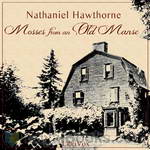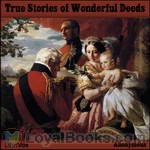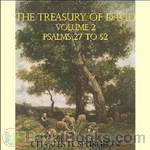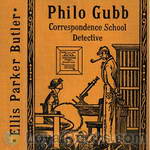|
Books Should Be Free Loyal Books Free Public Domain Audiobooks & eBook Downloads |
|
|
Books Should Be Free Loyal Books Free Public Domain Audiobooks & eBook Downloads |
|
Literature |
|---|
|
Book type:
Sort by:
View by:
|
By: H. M. Egbert (1879-1960) | |
|---|---|
 Jacqueline of Golden River
Jacqueline of Golden River
Jacqueline seems to have contracted a touch of amnesia, as she is found in an apartment with a dead man, and with a weapon in her hand. But she remembers nothing of any incident, remembers not her name nor where she comes from, not even why she is where she was found. She only remembers her father, and that he is in danger. Action and adventure soon follow, as Paul Hewlett and Jacqueline attempt to get answers to her questions, taking them on a journey into Quebec and points northward, and Paul knows that they are being followed during their trip... | |
By: Harry Harrison (1925-2012) | |
|---|---|
 The Repairman
The Repairman
This is a collection of 3 of Harry Harrison marvelous early stories that were published in Galaxy, Analog and Fantastic Universe. The Repairman (1958) is a straight fun SF story of a man getting a job done. It is most typical of his later style in series like the Stainless Steel Rat; Toy Shop (1962), a short piece exploring bureaucratic blindness and one ingenious way around it and The Velvet Glove (1956), my favorite for its writing style, fun perspective, sly social commentary on the scene in 1956 and just plain delightful imagination. And he manages to pack excitement and mystery in at the same time. | |
By: Frank R. Stockton (1834-1902) | |
|---|---|
 The Bee-Man of Orn and Other Fanciful Tales
The Bee-Man of Orn and Other Fanciful Tales
A collection of nine enchanting short stories filled with curious beasts and unexpected endings. Included are The Bee-Man of Orn; The Griffin and the Minor Canon; Old Pipes and the Dryad; The Queen's Museum; Christmas Before Last: Or, The Fruit of the Fragile Palm; Prince Hassak's March; The Battle of the Third Cousins; The Banished King; and The Philopena | |
By: Ray Cummings (1887-1957) | |
|---|---|
 The World Beyond
The World Beyond
Lee Anthony finds himself and two of his friends kidnapped and taken on a strange voyage. | |
By: Charles W. Diffin (1884-1966) | |
|---|---|
 Dark Moon
Dark Moon
Mysterious, dark, out of the unknown deep comes a new satellite to lure three courageous Earthlings on to strange adventures. | |
By: Lloyd Eshbach (1910-2003) | |
|---|---|
 The Gray Plague
The Gray Plague
End of the world sci-fi tale borrows heavily from H.G. Wells' WOTW and In The Days of the Comet -- looks like fun ! | |
By: Molière | |
|---|---|
 Tartuffe
Tartuffe
Jean-Baptiste Poquelin, known by his stage name Molière, was a French playwright and actor who is considered to be one of the greatest masters of comedy in Western literature. Among Molière's best-known works is Tartuffe or The Hypocrite, written in 1664. Though Tartuffe was received well by the public and even by Louis XIV, its popularity was lessened when the Archbishop of Paris issued an edict threatening excommunication for anyone who watched, performed in, or read the play.Tartuffe, a pious fraud who pretends to speak with divine authority, has insinuated himself into the household of Orgon... | |
By: William Shakespeare (1564-1616) | |
|---|---|
 The Rape of Lucrece
The Rape of Lucrece
The Rape of Lucrece (1594) is a narrative poem by William Shakespeare about the legendary Lucretia. Lucrece draws on the story described in both Ovid's Fasti and Livy's history of Rome. In 509 BC, Sextus Tarquinius, son of Tarquin, the king of Rome, raped Lucretia (Lucrece), wife of Collatinus, one of the king's aristocratic retainers. As a result, Lucrece committed suicide. Her body was paraded in the Roman Forum by the king's nephew. This incited a full-scale revolt against the Tarquins led by Lucius Junius Brutus, the banishment of the royal family, and the founding of the Roman republic. | |
By: Thomas Hardy (1840-1928) | |
|---|---|
 Wessex Tales
Wessex Tales
Wessex Tales is a collection of six short stories written by Hardy in the 1880’s. If you’ve never read Hardy they’ll serve as a good introduction to his writing. Though not as comprehensive as his major works they do contain all the ingredients that make him instantly recognisable. (Introduction by T. Hynes.) | |
By: Various | |
|---|---|
 Prefaces and Prologues to Famous Books
Prefaces and Prologues to Famous Books
Charles W. Eliot, 21st President of Harvard University, edited this volume of prefaces ... authored by a Who's Who of World Literature: Bacon, Calvin, Caxton, Condell, Copernicus, Dryden, Fielding, Goethe, Heminge, Hugo, Johnson, Knox, Newton, Raleigh, Spenser, Taine, Whitman and Wordsworth. Eliot wrote in his preface to these prefaces, "No part of a book is so intimate as the Preface. Here, after the long labor of the work is over, the author descends from his platform, and speaks with his reader as man to man, disclosing his hopes and fears, seeking sympathy for his difficulties, offering defence or defiance, according to his temper, against the criticisms which he anticipates." | |
By: Randall Garrett (1927-1987) | |
|---|---|
 A Spaceship Named McGuire
A Spaceship Named McGuire
Can a spaceship go crazy? Well, yes it can if it has a brain. And the new MG (magnetogravitic drive) experimental robot space ship does indeed have a 'brain'. Completely bewildered as to why the first six models of their supposedly perfect new ship model, the MG-YR, nicknamed the McGuire, have gone totally bonkers after activation and before they could ever be used, the company has called in the services of Daniel Oak. They suspect sabotage of course. Daniel Oak is the hard boiled private investigator with nerves of steel and a mind of the same substance... | |
By: Upton Sinclair (1878-1968) | |
|---|---|
 The Machine
The Machine
Upton Sinclair is best known for his novel The Jungle, an expose of the meatpacking industry. He was also a playwright whose works for the stage reflected the same progressive viewpoints found in his other writing. In The Machine, published as part of Sinclair's 1912 collection Plays of Protest, Socialist activists show a rich man's daughter the truth about the society in which she has been raised. | |
By: Robert Louis Stevenson (1850-1894) | |
|---|---|
 New Arabian Nights
New Arabian Nights
New Arabian Nights is a collection of short stories which include Robert Louis Stevenson's earliest fiction as well as those considered his best work in the genre. The first and longest story stars Prince Florizel of Bohemia who appears in the later collection of stories "More New Arabian Nights: The Dynamiter." | |
By: Susan Warner (1819-1885) | |
|---|---|
 Diana
Diana
Diana Starling is the beautiful and quiet daughter of a cold and mentally abusive mother. She falls in love with Evan Nolton, but her mother wishes her to marry someone else. Yet, despite her mother's strong objections, she chooses her own husband. However, she can be truly happy only if she forgets her first love. Will she find the strength do do that? (Introduction by Stav Nisser) | |
By: Nathaniel Hawthorne (1804-1864) | |
|---|---|
 Mosses from an Old Manse
Mosses from an Old Manse
"Mosses from an Old Manse" is a short story collection by Nathaniel Hawthorne, first published in 1846. The collection includes several previously-published short stories and is named in honor of The Old Manse where Hawthorne and his wife lived for the first three years of their marriage. A second edition was published in 1854, which added "Feathertop," "Passages from a Relinquished Work, and "Sketches from Memory."Many of the tales collected in "Mosses from an Old Manse" are allegories and, typical of Hawthorne, focus on the negative side of human nature... | |
By: Howard Pyle (1853-1911) | |
|---|---|
 Twilight Land
Twilight Land
The room was all full of twilight; but there they sat, every one of them. I did not count them, but there were ever so many: Aladdin, and Ali Baba, and Fortunatis, and Jack-the-Giant-Killer, and Doctor Faustus, and Bidpai, and Cinderella, and Patient Grizzle, and the Soldier who cheated the Devil, and St. George, and Hans in Luck, who traded and traded his lump of gold until he had only an empty churn to show for it; and there was Sindbad the Sailor, and the Tailor who killed seven flies at a blow,... | |
By: William Shakespeare (1564-1616) | |
|---|---|
 Venus and Adonis
Venus and Adonis
Venus and Adonis is Shakespeare's narrative poem about the love of the goddess Venus for the mortal youth Adonis, dedicated partly to his patron, the Earl of Southampton (thought by some to be the beautiful youth to which many of the Sonnets are addressed). The poem recounts Venus' attempts to woo Adonis, their passionate coupling, and Adonis' rejection of the goddess, to which she responds with jealousy, with tragic results. This recording features three different readers performing the narration, Venus, and Adonis. | |
By: Barry Pain (1864-1928) | |
|---|---|
 Eliza
Eliza
A gentle, yet deliciously humourous series of anecdotes following the life of the main character and his wife, Eliza. | |
By: Anonymous | |
|---|---|
 True Stories of Wonderful Deeds
True Stories of Wonderful Deeds
37 short pieces perfect for newer recorders. These one page Stories of (mostly) Wonderful Deeds were written for Little Folk to teach them about famous incidents in their history. Bonnie Prince Charlie, Nelson and Hardy, Bruce and the Spider, David Livingston, Canute, Sir Philip Sydney, and Elizabeth and Raleigh are just some of the well known people and incidents covered in short stories. | |
By: Maurice Leblanc (1864-1941) | |
|---|---|
 The Crystal Stopper
The Crystal Stopper
During a burglary at the home of Deputy Daubrecq a crime is committed, and two accomplices of Arsène Lupin are arrested by the police. One is guilty of the crime, the other innocent, but both will be sentenced to death. Lupin seeks to deliver the victim of a miscarriage of justice, but struggles against Deputy Daubrecq's ruthless blackmailer, who has an incriminating document hidden in a crystal stopper. | |
By: Richard Harding Davis (1864-1916) | |
|---|---|
 The Lost House
The Lost House
Austin Ford, the London correspondent of the New York Republic, is spending some idle time in the American Embassy chatting with the Second Secretary, when suddenly a note is brought in. This note is an appeal for help, found in the gutter in a dark alley. The writer claims to be a young girl, who is kept against her will locked up in a lunatic asylum by her uncle. Although the Second Secretary tries to convince him that there is nothing to it, the journalist is determined to follow the lead... | |
By: Charlotte Turner Smith (1749-1806) | |
|---|---|
 The Old Manor House
The Old Manor House
The proud, cruel and arrogant Mrs. Rayland never married. Therefore, "Rayland Hall", the old Manor House of the title, had to pass to their heir, Somerive, whom they never treated kindly. According to the British laws at the time, the heir must be the oldest son. But what is to be done when the second son is more worthy of it - and is more beloved by Miss Rayland herself? And must the fact that he is in love with a servant and dependent of Miss Rayland take its toll? | |
By: Charles H. Spurgeon (1834-1892) | |
|---|---|
 The Treasury of David, Vol. 2 (Abridged)
The Treasury of David, Vol. 2 (Abridged)
Charles Spurgeon was a British Particular Baptist preacher who remains highly influential among Christians of different denominations, among whom he is still known as the “Prince of Preachers”. In his lifetime, Spurgeon preached to around 10,000,000 people, often up to 10 times each week at different places. He was the pastor of the congregation of the New Park Street Chapel (later the Metropolitan Tabernacle) in London for 38 years.Spurgeon was a prolific author of many types of works. His accessible commentaries on the Psalms are a combination of meditation and teaching and are appropriate for anyone wanting to understand these familiar poems on a deeper level... | |
By: Ellis Parker Butler (1869-1937) | |
|---|---|
 Philo Gubb, Correspondence-School Detective
Philo Gubb, Correspondence-School Detective
Philo Gubb, not being content with his job as wallpaper-hanger, has higher aspirations: to become a detective, just like Sherlock Holmes. To that end, he enrolls in a correspondence course, where he gets lessons through the mail as well as the necessary disguises for a detective. Philo Gubb, not being really clever or intuitive, or even looking good in those disguises, gets involved in one case after the other - and sooner or later happens to stumble on and solve the crime... Each of these stories... | |
By: Jack London (1876-1916) | |
|---|---|
 The Game
The Game
Jack London wrote at least four stories about boxing; A Piece of Steak (1909), The Mexican (1911), The Abysmal Brute (1911), and The Game (1905). The Game is told, in part, from the point of view of a woman, the fiancée of one of the competitors. This is to be his last fight and they are to be married on the morrow. Against her better judgment, she agrees to watch the bout. (Introduction by Tom Crawford) | |
By: Eleanor H. Porter (1868-1920) | |
|---|---|
 Miss Billy Married
Miss Billy Married
At the opening to this second sequel to Miss Billy (Miss Billy, Miss Billy's Decision, Miss Billy Married), we find Bertram and Billy finally at the altar. Will wedded bliss ensue and are the patter of little feet on the horizon? Or is misunderstanding and heartache in the cards again? Find out in Miss Billy Married! | |
By: Stendhal | |
|---|---|
 The Red and the Black, Volume I
The Red and the Black, Volume I
Stendhal - a German pen-name for a French writer who hated the English. Contemporary to some of the great names of French literature like Balzac and Flaubert, Stendhal is quite often considered a writer that doesn't seem to fit a defined genre. Some say he's a Romantic, others that he's a Modernist and that Le Rouge et Le Noir is the first modern novel. On one point they are all agreed: the novel is a masterpiece that shows a young theology student - Julien Sorel - intelligent, handsome and who is determined to rise above his humble peasant origins... | |
By: Marie Corelli (1855-1924) | |
|---|---|
 Ziska
Ziska
The story revolves around the mysterious Princess Ziska, who captivates a set of European tourists who are spending time in exotic Egypt. The story is a mystery involving reincarnation, romance & a touch of mild horror. (introduction by ilianthe) | |
By: Katherine Mansfield (1888-1923) | |
|---|---|
 In a German Pension
In a German Pension
The first collected volume of short stories of the New Zealand modernist. Inspired by her own travels, Mansfield begins to refine her craft with a series of tales which depict German life at the brink of the first world war. (Introduction by S. Kovalchik) | |
By: Saki (1870-1916) | |
|---|---|
 The Toys of Peace
The Toys of Peace
This is the fifth collection of short stories by Saki (H.H. Munro), and was published posthumously in 1923. Even so, many of the stories are quite up to the standard of those collected earlier. | |
By: Richard Harding Davis (1864-1916) | |
|---|---|
 The Make-Believe Man
The Make-Believe Man
Adventure was what our protagonist was looking for, when he boarded the steamer "Patience" for his holiday, and when one has a man with such a vivid imagination like Joseph Forbes Kinney as a travel companion, who seems to find adventures at every turn of the road (and if not, he manufactures them), the two travellers are sure to stumble into trouble... | |
By: Murray Leinster (1896-1975) | |
|---|---|
 The Ambulance Made Two Trips
The Ambulance Made Two Trips
Big Jake Connors is taking over his town through violence, inimidation and bribery but Detective Sergeant Fitzgerald can only grind his teeth in frustration. The gangsters seem to have everything going their way until the day that a little dry cleaning establishment declines their offer of 'protection' and strange things start to happen. Murray Leinster gives us another wonderful product of 'what if' from his limitless imagination to enjoy in this gem of a story. Listen and smile. | |